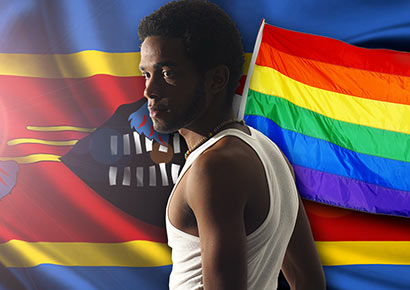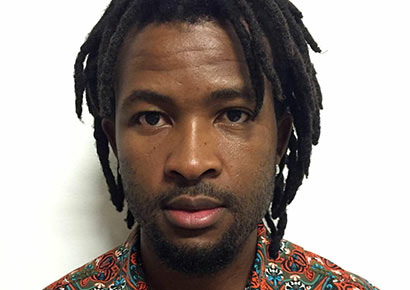Hope and defiance – Swaziland aims to hold its first LGBT Pride
 Amid plans to hold the first-ever Swaziland Pride, Mambaonline spoke to activist Melusi Simelane about LGBT life in one of the world’s last remaining absolute monarchies.
Amid plans to hold the first-ever Swaziland Pride, Mambaonline spoke to activist Melusi Simelane about LGBT life in one of the world’s last remaining absolute monarchies.
Simelane is Communications Manager for The Rock of Hope, the country’s most prominent LGBT group. The organisation has been running an online campaign through All Out to raise funds to host the historic event.
Swaziland, a small landlocked country in Southern Africa, is ruled by King Mswati III, alongside a parliament; but he has the final say on appointing judges, the country’s prime minister and a number of representatives in parliament.
The nation is bedevilled by poverty, TB and HIV (it has one of highest infection rates in the world) as well as human rights issues, including the suppression of political dissent.
It’s also not a welcome environment for LGBT people. King Mswati has reportedly called same-sex relationships “satanic”, and Prime Minister Barnabas Dlamini has described homosexuality as “an abnormality and a sickness”. The government has even questioned whether LGBTI people actually exist in the country.
Mambaonline asked Simelane about the challenges of being LGBT in Swaziland and his organisation’s plans to put on the Pride event.
What is the legal status of LGBT people in Swaziland at the moment?
We have the common law offences that include the offence of sodomy. Otherwise, there is a legal vacuum in terms of protection from discrimination. For instance, the protections enshrined in the constitution exclude sexual orientation.
Are LGBT people actively prosecuted by the authorities?
There hasn’t been any prosecution that we have encountered. The government has repeatedly assured us that it is their policy not to prosecute. However, that is a different case from police procedures. For instance, under the Criminal Procedures Act of 1938, I can be arrested without a warrant, if I am suspected to have committed sodomy.
So while there are no prosecutions that could change any time…
The government says they will not prosecute consenting male adults, but we say, ‘you cannot be holding a gun at me, and argue that your policy is not to shoot’. It is not a conducive environment to live in, where you are told not to worry, you will not get shot, but there is the gun pointing directly at you.

Melusi Simelane
And in other areas of life?
We have the daily persecution in terms of verbal attacks, and even systematic exclusions from basic human rights. Hospitals continue to discriminate based on sexual orientation. People are fired from their jobs based on sexual orientation and gender identity. All these can easily go unpunished, because the government insists that we do not exist.
How are LGBT people treated by the rest of society?
It is a very trying environment. It is easier for the brave, but the truth of the matter is, I should not have to be brave for me to fit in any society; societies should be welcoming of all persons. We have people that are welcoming and want to learn more about LGBT persons. However, there are those hell-bent on seeing us perish. They are sadly supported by government sentiments, of the nonexistence of LGBT persons in the country.
What is the biggest challenge facing the LGBT community in Swaziland?
Basic government recognition. That would be the most fundamental gain in our advocacy. We have a Prime Minister who denies our existence, and we have a Ministry of Health, that refuses to acknowledge who we are. They would rather we are addressed as MSM (men having sex with men), something that reduces us to a sexual behaviour, only for their benefit to appear to be inclusive.
What impact do you think holding a Pride event in Swaziland will have? What would you like it to achieve?
We think visibility is the key that will push the message and conversation further. Also, events that provide safe spaces for LGBT people to celebrate their identities are sorely lacking. Further, opportunities for the larger Swazi society to interact with the LGBT community in a positive way are rare. Around the globe, annual LGBT Pride events have proven successful at providing safe spaces for LGBT communities to congregate and celebrate their identities in public, as well as introduce the larger society to non-normative sexual and gender identities through a positive, celebratory environment. We are looking at achieving, at least these goals.
Do you think the authorities will allow you or give you a permit to hold a Pride event?
Why wouldn’t they? I would be interested to hear them argue their way out of that.
What are the biggest challenges in trying to hold the first Swaziland Pride?
Perhaps the local buy in. Having local business associate with us. Having people even attend. That is scary.
Do you have a date when you would like to have the event take place? And how much money are you needing to raise?
We are looking at the last weekend of June. And in terms of money, I would say, we can use any extra help we get. But not just monetary. We are seeking support from business, to come and be a part of the event, and they should be able to get some marketing out of it.
Are you hopeful for LGBT people in Swaziland?
We live in times of possibilities. We have a new president in [neighbouring] South Africa who is a great supporter of LGBT rights, and he also sits as the Head of SADC (Southern African Development Community). That is promising. Botswana had a milestone ruling on gender issues, and we are looking at hosting the first Pride march. The future is bright. Swaziland cannot be left out when the world is progressing. There is talk locally of a vision of First World Status by 2022. We are saying that is all well and good but there cannot be first world status without respect for basic human rights…”
If you’d like to support Swaziland Pride, go to the All Out campaign page.
- Facebook Messenger
- Total390
Leave a Reply